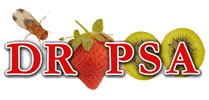Anyone with a fruit tree in his garden knows all about it: by the time a fruit is mature, it has often been damaged or completely eaten by pests. For fruit farmers, preventing such losses is a continuous struggle. A new EU-funded project will now look into solutions to help them.
The DROPSA project aims to reduce and prevent damage to fruit crops by pests and pathogens. It focuses particularly on Drosophila suzukii (D.suzukii) — commonly known as the spotted winged Drosophila. Originating from Asia, D.suzukii is a fly with a taste for cherries and red fruit, whose arrival in Spain was well documented in 2008. Since then it has taken up residence in most European countries, with females leaving their eggs in the fruit to hatch and ultimately destroy it.
Other pathogens being covered by the project are Pseudomonas syringae pv. actinidiae, Xanthomonas arboricola pv. pruni and Xanthomonas fragariae, which cause bacterial speck and leaf spot respectively.
“This innovative project brings together the very best expertise in integrated pest management of fruit pests and diseases. Working together, we are confident that the project will lead to ground-breaking solutions to minimise and prevent damage to fruit crops,” Neil Audsley, Insect Endocrinologist at Fera and coordinator of the project, said in a press release. These should include innovative and effective chemicals, antimicrobial compounds and biological control agents, to be combined in an integrated pest management strategy.
DROPSA is a two-step project, with scientists first looking to determine the way in which these pests can be introduced and spread, before drafting preventive strategies and recommendations to guard against their spread. The team will perform a comprehensive evaluation of the pest and pathogens life cycles, their capacity to disperse, their interaction with plants and, last but not least, it will identify their natural enemies.
“The knowledge and information gained will be used to provide practical, cost-effective and sustainable solutions that can be widely implemented by the EU fruit industry,” Audsley added.
The team expects its findings to help prevent not only the targeted pests and pathogens from spreading, but also the introduction of other dangerous fruit pests and pathogens in Europe.
The €6 million project will run until 2018. It involves Fera and 25 other national and international partners, including world-renowned experts from Europe, North America, New Zealand China and Japan.




